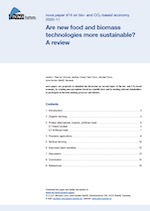 The results of the review are summarised in „key facts“ for each technology.
The results of the review are summarised in „key facts“ for each technology.
Most modern food and biomass production technologies have both positive and negative aspects that are, to a certain degree, interdependent. The apparent incommensurateness of animal welfare and low environmental impacts in (organic) livestock production is a good example for the challenges of sustainable food production.
While some technologies can drastically reduce the amount of water and land required for production, they are on the other hand consuming considerable amounts of energy.
However, it has to be considered that technologies and concepts such as artificial meat and vertical farming are, to this date, still in their infancy, and that advances and improvements can be expected within the next years. It is crucial to find a balance that comprises the three dimensions of sustainability and can thereby satisfy the needs of the producers, consumers, and, most of all, the environment.
“nova-Paper#14: Are new food and biomass technologies more sustainable? A Review” is available for free at www.bio-based.eu/nova-papers
Source
nova-Institut GmbH, 2020-11-04.
Supplier
Share
Renewable Carbon News – Daily Newsletter
Subscribe to our daily email newsletter – the world's leading newsletter on renewable materials and chemicals










